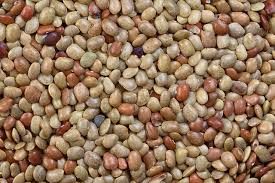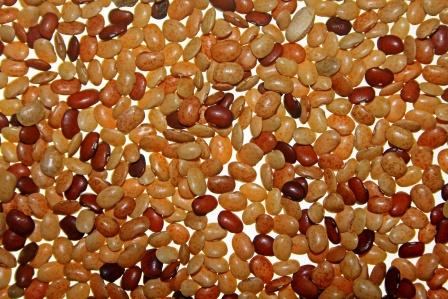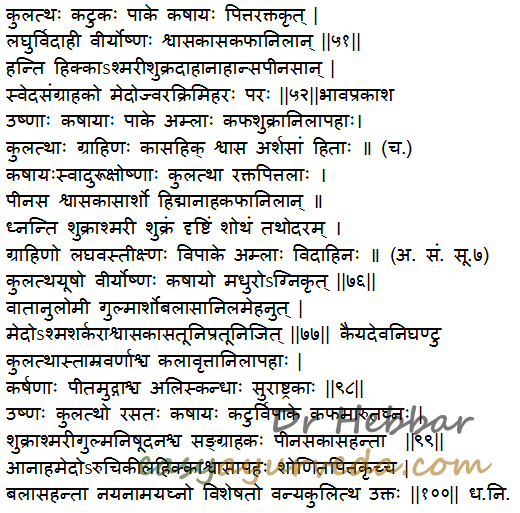Horse Gram Uses, Recipes, Dose, Side Effects
Horse gram – Dolichos biflorus Linn.is an ayurvedic herb used for the treatment of kidney stones, cough, asthma, piles etc. It is called Kulattha in Ayurveda.
Botanical Name- Dolichos biflorus Linn. Also called Macrotyloma uniflorum.
Family- Leguminosae (Simbi kula)
Table of Contents
Vernacular names
Names in different languages:
English name – Horsegram, Cowpea
Hindi name – Kulathi
Telugu name – Ulavalu
Kannada name – Huruli
Tamil name – Kollu
Unani – Kulthi

Sanskrit Synonyms
Kulattha, Kulatthika,
Peetamudga – resemble mung bean but yellow in color
Tamra Varna – seeds with copper color
Surashtraka – grows in Saurashtra region – Gujarat
Druk Prasada – good for eyes
Habitat, varieties
Habitat: Horsegram is a shrub grown and cultivated in the plains of Indian states like Maharashtra, Andhra Pradesh, Karnataka, Madhya Pradesh, for its seed. The whole seeds of horsegram is used as cattle feed. Its whole seed is also consumed, as sprouts or whole meals in some parts of India.
Varieties:
The herb Kulattha is available in two types based upon the cultivating pattern
- Wild variety
- Local grown variety
Dolichos biflorus is classified into 4 types based upon the color of the seeds
- Red
- White
- Black
- Brownish
Botanical classification
Kingdom: Plantae
Family: Fabaceae
Genus: Dolichos
Division: biflorus
Classical categorization
Charaka- Swedopaga – Group of herbs used in sweating treatment
Vagbhata- Niruhopaga – Group of herbs used in Niruha Basti
Kaiyyadeva Nighantu- Krutanna varga
Dhanvantari Nighantu- Suvarnadi varga
Bhava Prakasha- Dhanya varga
Rajanighantu – Parpatadi Varga

Properties, part used
Horse gram medicinal properties:
Rasa (Taste) – Kashaya – astringent
Veerya (Potency) – Ushna – Hot
Guna (Qualities) – Laghu – light to digest, Rooksha – Dry in nature, Teekshna- Pungent
Vipaka- Amla – After digestion it undergoes into sour taste
Prabhava (Special effects) – Ashmari Bhedana- breaks down the renal stones
Effect on Tridosha- As the drug is predominant of Kashaya rasa, it is Kapha vata shamaka (reduces the vitiated Kapha and Vata) and Rakta Pitta kopaka (increases the Rakta and Pitta dosha)
Part used- Seeds which are reddish brown in color.
Chemical constituents
Major chemical Constituents of Kulthi:
Horse gram seeds contain 21% of crude protein, 11% of pentosan and about 3% of water soluble gum. They also contain traces of urease and phosphorus. The other chemical constituents present in the seeds are Genistein, Dalberioidin, Phasw and Collidin.
Nutritional value, dosage
The mean protein value of the horsegram seeds is 25.5% which is more or less equivalent to soybean, winged bean. Nutritionally the horse gram seeds are rich in lysine content when compared to gram pulse.
The leaves of the herb Dolichos biflorus may be used in Vitamin C deficiency, due to the presence of ascorbic acid and calcium.
Dosage– Seed powder- 4-6 g
Decoction of the seed- 40-50 ml per day in divided doses.
Paste of seed: For external application.
Uses
Uses of Dolichos biflorus:
- The paste of Kulatta seeds are used for fomentation to relieve localized swelling. The seeds stimulate and increase sweating, thus opening the sweat pores of the body to push out the toxins from the body.
- The seed of the herb is powdered, burnt and the smoke coming from it is inhaled to relieve hiccups.
- Cold infusion (Hima) of the seeds of horsegram is taken in a dosage of 80-100 ml per day to treat renal calculi, difficulty in micturition and pain in the urinary bladder.
- The powder of the seeds in a dosage of 10-12g per day is used to treat renal calculi.
- Seeds of Dolichos biflorus are given in the form of decoction to relieve intestinal worms, treat piles and relieve constipation.
- It induces menstrual periods. Hence people with prolonged menstrual cycle, scanty bleeding (oligomenorrhea), are advised to use horse gram in their diet regularly.
Sanskrit verse

Traditional uses:
Sweda Sangrahaka – it causes sweating
Sara – laxative, promotes movement of liquids in channels
Vidahi – causes burning sensation
Vatanulomi – Causes normal movement of Vata in its proper direction
Shwasa – asthma, respiratory disorders involving difficulty in breathing
Kasa – cold, cough
Diseases of Kapha and Vata Dosha imbalance
Hikka – hiccough
Ashmari – calculi
Daha – Burning sensation
Anaha – bloating
Peenasa – rhinitis
Meda – obesity
Jwara – fever
Krumi – worm infestation (in wounds and in intestines)
Shwasa – asthma, respiratory disorders involving difficulty in breathing
Arsha – Hemorrhoids
Shotha – oedema, swelling, inflammatory conditions.
Udara – Ascites
Tuni, Pratituni – lower abdominal pain
Akshiroga – eye disorders
Horse gram is boiled with water, its steam is used for local sweating treatment, called Nadi Sweda, in Vata imbalance disorders (Charaka Vatavyadi Chikitsa)
Use of horse gram in treating piles:
If the patient is suffering from non bleeding piles with constipation, then he is encouraged to include horse gram in his diet.
But if it is bleeding piles, then it is best to avoid horse gram.
Precautions, side effects
People suffering from hyperacidity, gastric ulcers should not take this herb or any formulation containing this herb as it will worsen the disease condition.
Acharya Charaka in Ayurveda has said that Kulattha is the herb which can cause amlapitta (Hyperacidity)
It is described as Raktapittakrut – It worsens bleeding disorders. Hence, not ideal in people having nasal bleeding, menorrhagia (heavy periods) etc
Shukrahara – it can decrease semen and sperm quality and quantity. Hence, people seeking male infertility treatment should avoid or reduce the intake of horsegram.
In case of gout, because Rakta dhatu is involved, horse gram is best avoided.
When you are taking Shilajit, Horse gram should be avoided, as it increases Pitta Dosha.
In people taking Tapyadi Yoga, a medicine for the treatment of anemia, taking horsegram is contraindicated. (Charaka Pandu Chikitsa)
Horse gram recipes
Healthy horse gram recipes:
Take 4 teaspoons of horse gram, add half liter of water, heat this mixture up until it reduces to one fifth, collect soup, add 2 teaspoons of crushed pomegranate seeds, mix, filter and take once a day. This is especially useful in kidney and bladder stones.
Can Horse Gram Reduce the Size of Kidney Stones?
Vegetable soup of ber fruit, horse gram, coriander, bael, or barley – are indicated in the treatment of vomitting with gastritis. (Charaka Chikitsa 20th chapter)
Interaction with medicines, supplements
Can this be used while taking Homeopathic medicine?
Yes. This product does not react with homeopathic medicine.
Can this medicine be continued while taking supplements like multivitamin tablets, Omega 3 fatty acids etc?
Yes. Generally, this product goes well with most dietary supplements. However, if you are taking more than one product per day, please consult your doctor for an opinion.
With western medicines
Seek your doctor’s advice if you are taking this product along with other western (allopathic / modern) medicines. Some Ayurvedic herbs can interact with modern medicine.
If both Ayurvedic and allopathic medicines are advised together, then it is best to take Allopathic medicine first, wait for 30 minutes and then take the Ayurvedic medicine.
Horse gram increases Pitta
Sir did you mention kulthi / horse gram as a cause of blood impurity?
Dr JV Hebbar:
Yes. Horsegram is hot in nature and excess of it can cause Raktapittakrit – vitiate Pitta dosha, increase bleeding tendency and weaken blood vessels.
Hence, people with aggravated Pitta dosha should not use horse gram.
Ayurvedic formulations
Formulation containing Kulattha:
- Dhanvantaram Ghritam– useful in treating abscess, hemorrhoids, anemia
- Kolakulathadi Choornam– useful in treating inflammation of joints, lumbago
- Sukhaprasava Ghritam– for easy delivery
- Sarvamayantaka Ghritam– useful in treating gout, Parkinson’s disease, neck stiffness,
Research
Research articles on Dolichos biflorus:
- Seeds of the herb kulattha is shown to have antihistamine action in the management of asthma
- The seeds are antioxidant and antiradical in nature.
- Anti obesity property is seen in the seeds of Dolichos biflorus.
- The seeds are known to have anti urolithiatic property.
Author:
Dr.B.K.Prashanth M.D (Ayu), Ph.D
E mail: [email protected]
Sthanika Karma (Systemic Action)
External use – Helps to reduce swelling, It can be used for collyrium in Eye disorders. Paste of kulattha is indicated in a condition called karnamoola sotha in Sannipatajvara. (Lymph node enlargement in Infective disorders). Also indicated in excess sweating.
Internal administration
Digestive system – It can cause burning sensation in the digestive tract. Facilitate normal movement of doshas, Purgative in nature, Ant helminthic. Indicated in Abdominal distention, Hepatic and splenic disorders, Colic pain, Hemorrhoids, Helminthiasis. Overdose causes gastric irritation.
Respiratory system – Pacify kapha dosha,. Indicated cough, breathing difficulty, Hiccough etc.
Reproductive system- It is used as a uterine stimulant in cases of Dysmenorrhea and postpartum delivery care. It promotes uterine contractions, facilitating the expulsion of remnants after delivery.
Excretory system – In Renal colic, Calculi and in Dysuria Its powder along with Radish leaf juice can be administered.
Tapakrama – Jvaraghna (indicated in fever)
Satmikarana – It has a scraping action on Tissues, Especially on Sukra dhatu (Sukranasaka). Also indicated in obesity and related disorders











42 comments
Pavi
Dear doctor,
What should be the minimum age to consume horsegram?
Thanks,
Pavi
Dr Malini Bhat
Madam, It can be consumed by all. For the kids the soup of it is preferable.
Snehal Ingle
Kolakulathadhi has kulath but it is used for external application, any medicine for renal stone, with more efficacy,
Dr Malini Bhat
Hello madam, Some remedies:
• Take 1 cup of horse gram.Add ½ L water.Heat the mixture till water level reduces to 1/5th. Strain and collect the soup. Add 2 tsp of crushed pomegranate seeds.Mix well. Drink once a day
• Take 10-15 basil leaves.Crush them to make paste. Take 1 tsp of basil leaf paste.Press on a sieve and extract its juice.Add 1 tsp honey. Mix well. Drink this every day
• Drink a glass of apple juice every day.
• Drink coconut water, barley water.
• Pashana bheda swarasa in empty stomach.
Snehal Ingle
How much days to consume for stone 6 mm in rt. Kidney. 7 mm in left.
Dr J V Hebbar MD(Ayu)Author
For about 4 – 6 weeks.
ASHWIN R PATEL
Is the Powder made using RAW horse gram seeds or is it cooked before powdering?
Dr J V Hebbar MD(Ayu)Author
Hi, powder can be made with raw seeds or after little dry frying in a pan.
Ashwin Patel
Thank you. I will try it Raw.
vinay
which phyto-constituents of horse gram is responsible for treating the renal stone ?
Dr J V Hebbar MD(Ayu)Author
Phytic acid, Phytate phosphorus, and aqueous extract of horse gram are known to treat renal stone.
Dr J V Hebbar MD(Ayu)Author
Hi, as per my knowledge, horsegram is not contra indicated in your case.
Dr J V Hebbar MD(Ayu)Author
A 3 mm sized stone is very small and daily usage of horsegram for 10 – 15 days will help its removal. If he wishes to confirm its removal, he may have to collect urine everytime to see the passed stone or he can take an x ray test / abdominal scan after a month time.
Sarita
is horsegram good for CKD (Proteinuria)
Dr J V Hebbar MD(Ayu)Author
Horsegram can be taken by a person with CKD.
Revathi
For pitta body type what is the quantity should have take daily for wight loss?
ESN Murthy
Horse gram appears to be the magical pulse for Renal Stone. I have 4 mm stone in the Lt Renal and Ureteric calcucli (8 mm). How should i take horsegram in the form of powder, decoction, or any other way . How long should i take for complete disolution of the stone. I am aged 62 years
Marish
Sir, shall I take horse gram daily to reduce my weight? If it so, what’s the quantity I should take per day?
Soundarya
Can u pls suggest how horse gram is useful in pcos problem?
Deekhu
How many grams to consume for weight reduction??how many days it takes??
Dr J V Hebbar MD(Ayu)Author
5 – 10 grams, once or twice a day.
naresh kumar
Gallbladder stones ke liye effective h kya
Dr J V Hebbar MD(Ayu)Author
Depends on size and number of stones. Please consult an Ayurveda doctor directly.
Pradeep
Sir what is the best way to consume horse gram for a pitta body type.
Pradeep
Thank you sir!!
Dr J V Hebbar MD(Ayu)Author
Boiled / cooked is better.
Dr J V Hebbar MD(Ayu)Author
Morning, after food.
vaishnavi
how many kgs lose when we take horsegram in one month
Dr J V Hebbar MD(Ayu)Author
About half – 1 kg. If exercise and diet restrictions are maintained, then may be even more.
Dr J V Hebbar MD(Ayu)Author
Hi, you can drink the boiled water or just use horse gram in making sambhar etc.
K VASUDEVAN
Dear Dr. Hebbar
Can Horsegram be used to handle higher levels of creatinine, say 3.8 levels
Dr J V Hebbar MD(Ayu)Author
Useful, to some extent.
Kiran
My amh levels are very low what medicines should I take
Shyja
Sir what is the cause of palpitation
Dr J V Hebbar MD(Ayu)Author
Read the full list of causes here
https://www.mayoclinic.org/diseases-conditions/heart-palpitations/symptoms-causes/syc-20373196
Pallavi L
i read in a ayurvedic book ulavalu(horse gram) should be included in diet in sharat rutu..
but as u mentioned it causes pitta imbalance.. confused.
Dr J V Hebbar MD(Ayu)Author
As per Charaka Samhita, Sutrasthana TasyaShiteeya Adhyaya, it does not mention horsegram in autumn.
Reference:
https://www.easyayurveda.com/2013/12/09/ayurvedic-seasonal-regimen-charaka-samhita-sutrasthana-6th-chapter/
Ashtanga Sutrasthana also does not mention aboit it
https://www.easyayurveda.com/2012/11/14/ritucharya-ayurvedic-seasonal-regimen-3rd-chapter-ashtang-hriday/
What is your reference?
Yaaz
Does horsegram causes permanent pregnancy issues?
Dr J V Hebbar MD(Ayu)Author
No.
Vijayalakshime bala
Shall we add horse gram for 10 months baby in sathumaavu or health mix powder
Dr J V Hebbar MD(Ayu)Author
Only a little but.
Jitender
kulathi not shukra har however it increases sperm quality by doing dhatu shodhana.
However it may cause fat loss but shukura har nowhere mentioned they are mentioning it as shukara shodhna.
Please correct it.